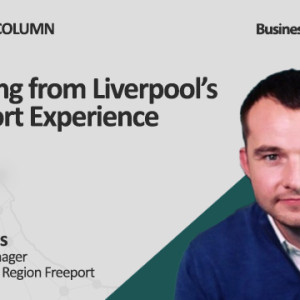Learning from Liverpool’s Freeport Experience


Freeports are a powerful economic lever but their value is ultimately judged in what they deliver. In Liverpool City Region, we're now just over two years into our freeport designation. While still early days in the context of a 25-year project, we are beginning to see tangible signs of progress: significant investment, early job creation and strong engagement from businesses who understand the potential of operating within a freeport.
At their core, freeports are geographic areas targeted for sector-specific growth where a package of tax and customs incentives apply. These are designed to encourage investment, promote innovation and support regeneration. In Liverpool City Region, we've worked hard to align these incentives with our wider economic development strategy, ensuring they complement existing sector strengths in areas like advanced manufacturing and life sciences.
This approach is already showing results - around GBP250 million of investment has been secured, and we're starting to see the first purpose-built units reaching completion. The customs incentives often attract particular interest from businesses - and rightly so. What the freeport model does well is bring together a range of customs procedures under one roof, simplifying what can otherwise be a complex landscape.
There are three main customs benefits: duty suspension, duty inversion and duty exemption. Duty suspension means that businesses can bring goods into a freeport customs site without immediately paying import duty or VAT. That's a clear advantage for firms who don't need to use those goods straight away.
Duty inversion allows businesses to pay duty on the final product if the rate is lower than the component parts - a benefit that will be familiar to those used to inward processing relief. And duty exemption means that if goods are brought into a freeport and subsequently re-exported, no customs duty or VAT is payable at all. In Liverpool City Region, we've seen a healthy mix of firms taking advantage of these opportunities - from manufacturers using the incentives for their own supply chains to third-party logistics firms storing goods on behalf of clients.
Seven customs sites have now been designated across the Liverpool City Region Freeport. It's not a light-touch process - businesses need to demonstrate strong security, traceability of goods and compliance with HMRC's Freeport criteria - but for those it suits, the benefits can be significant. Tax incentives are another important part of the freeport offer.
These include enhanced capital allowances, relief from stamp duty and employer NICs, and business rates relief. But these aren't offered unconditionally. In Liverpool City Region, we've introduced a gateway policy to guard against displacement - a common concern raised about freeports.
We don't want to see businesses relocating a short distance simply to take advantage of tax breaks. That policy allows our freeport board to withhold business rates relief if a move fails to demonstrate new investment, job creation or social value. This principle of 'additionality' is at the heart of everything we do.
The goal isn't to shift economic activity from one part of the region to another. It's to attract new businesses - including international investors who recognise the freeport model from elsewhere - and to support existing UK businesses looking to grow. Encouragingly, the enquiries we're receiving suggest we're on the right track.
Eligibility for the freeport is rooted in that same principle. We're looking for businesses who can demonstrate fresh investment, create jobs, and contribute to the wider economic and social goals of the region. The design of the tax incentives also reinforces this.
The more a business invests, the more people it employs, the greater the incentive. That structure helps to make sure the benefits are proportionate and tied to genuine economic impact. Looking ahead, our success will not just be measured in investment totals or the number of jobs created - although both will matter.
It will also be judged by the longer-term legacy we're able to build. Local authorities retain the business rates generated within freeports, and how that is reinvested locally - in infrastructure, skills or support for SMEs - will shape the broader economic benefits over time. The lessons from Liverpool City Region may be useful for other freeports as they develop.
Clear governance, transparency on eligibility, and a strong focus on additionality are all key. So is the ability to explain the offer in practical, understandable terms to the business community. There's more work to do, but we're encouraged by the early results - and by the growing recognition among businesses that freeports are not simply about tax, but about long-term economic opportunity.
Giles Jones talks about this and more in the Celtic Freeport[1]: Unlocking Opportunity podcast episode Inside the Incentives: Tax and Financial Benefits for Businesses in the Celtic Freeport[2]. Listen to the podcast here.[3]
References
- ^ Celtic Freeport - Homepage (businessnewswales.com)
- ^ Celtic Freeport - Homepage (businessnewswales.com)
- ^ Listen to the podcast here. (businessnewswales.com)